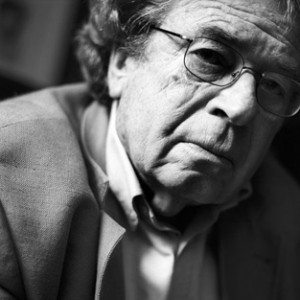 George Konrad (Konrád György) was born on 2nd April 1933. He studied literature, sociology and psychology. From 1959 to 1965 he worked as a social worker. In the same period he edited the collected works of Tolstoy and Balzac and published his first essays and journalistic writings.
George Konrad (Konrád György) was born on 2nd April 1933. He studied literature, sociology and psychology. From 1959 to 1965 he worked as a social worker. In the same period he edited the collected works of Tolstoy and Balzac and published his first essays and journalistic writings.
In 1965 Konrad started working at the scientific department of the Institute for Urbanism. Around that time he started collaborating with sociologist and urban sociology theorist Iván Szelényi. The two co-authored the extensive historical-philosophical study entitled The Intellectuals on the Road to Class Power – the police confiscated the manuscript in 1974 brought charges against the authors which was soon abandoned. Szelényi emigrated, while Konrád was practically not allowed to publish anything in Hungary until 1988. He spends the period between 1976 and 1984 mainly abroad on scholarships of different foundations – two years in West Berlin, then in the USA; he travelled around Europe, Australia and America.
George Konrad was one of the leaders of the democratic opposition in one-party Hungary, and one of the founders of the largest liberal party – the Union of Free Democrats. He has received Herder’s Award (1983), European Essay Award (1985), The Peace Award of German Publishers and Booksellers (1991), The International Literary Award ‘Stefan Mitrov Ljubiša’ (1998), Goethe’s Memorial Medal (2000), The International Carlo’s Award (2001), The Human Rights Award ‘Franc Verfel’ (2007) and the Jewish Book Council Award (2008). He has received the highest state decorations of Hungary, France and Germany and is an honorary Doctor of the University of Antwerp (1990) and Novi Sad (2003).
From 1990 to 1993 he was president of the International PEN club and between 1997 and 2003 he presided over the German Academy of Arts Berlin-Brandenburg.
Works:
The Case Worker (A látogató, novel, 1969); The City Builder (A városalapító, novel, 1971); Temptations of Autonomy (Az autonómia kísértése, essays, 1980); The Loser (A cinkos, novel, 1989); Antipolitics (Antipolitika, essays, 1989); A Feast in the Garden (Kerti mulatság, novel, 1989); Dragomán és Melinda (novel, 1989); At the Navel of Europe (Európa köldökén, essays, studies, 1990); The Melancholy of Rebirth (Az újjászületés melankóliája, essays, articles, studies, 1991); Stonedial (Kőóra, novel, 1994); Awaiting (Várakozás, essays, articles, 1995). The Current Listing (Áramló leltár, essays, articles, 1997); The Invisible Voice: Meditations on Jewish Themes (A láthatalan hang, essays, 1997); Heritage (Hagyaték, novel, 1998); The Yugoslav War (A jugoszláviai háború, polemics, 1999); Ready for a Journey (Útrakészen, essays, articles, 1999); What Does a Green Frog Know? (Mit tud a levelibéka, selected essays, 2000); Leaving Home and Coming Home (Elutazás és hazatérés, autobiographic novel, 2001); Solar Eclipse, on a Hill (Fenn a hegyen napfogyatkozáskor, autobiographic novel, 2003); A Writer and a City (Az író és a város, essays, speeches and articles, 2004); The Sorrow of Roosters (Kakasok bánata, novel, 2005); Marvellous Figures (Csodafigurák, literary portraits, essays 2006); Pendulum (Inga, novel, 2008).
www.konradgyorgy.hu